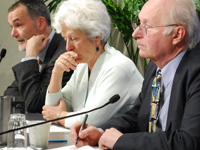Registration
You will receive an email confirming your registration.
IMGXYZ1233IMGZYXIt has been two years since the establishment of al-Qaeda in the Islamic Maghreb (AQIM). Although many questions remain about the organization's intentions, capabilities, and reach, it is evident that AQIM has thus far failed to integrate other North African jihadist networks, preventing its expansion beyond its traditional strongholds in Algeria.
Jean-Pierre Filiu, associate professor at the Paris Institute of Political Studies at Sciences-PO, discussed AQIM within the framework of the larger crisis inside al-Qaeda. He was joined by William Quandt, Edward R. Stettinius professor of Politics at the University of Virginia, who responded to his presentation. Carnegie’s Marina Ottaway, moderated the session.
Filiu argued:
- There would not have been an al-Qaeda organization in North Africa without the war in Iraq. The war provided an opportunity for the Algerian Salafist Group for Preaching and Combat (GSPC) to both develop an aggressive campaign of suicide bombings in Algeria compatible with global Jihadi rhetoric and to fight the U.S. directly in Iraq.
- The stabilization of Iraq combined with the successful implementation of national reconciliation in Algeria, has helped significantly curb Al-Qaeda’s influence and activities in North Africa.
- Because AQIM grew mostly out of Algerian networks, it has not been able to spread its message globally. As a result the organization has experienced a relative decline in its activities.
William Quandt said:
- It is important to understand AQIM against the back ground of recent Algerian history. Using Islamist rhetoric as a way to challenge the legitimacy of the Algerian state first became a dominant form of opposition during the end of the 1980s when socio-economic disparities were high. The current global financial crisis is creating similar circumstances which might pave the way for easier recruitment by terrorist groups.
- But Islamist radical jihadism failed in Algeria because of strong action by the security forces and later the amnesty granted by the president. The country’s experience with wide spread violence in the 1990s and the success of counter-insurgency policies make it less likely that violence will resume on a large scale.
- The number of AQIM members is limited to a few hundred.
In the questions and answers session Filiu further commented on AQIM’s problems with recruiting new fighters, Libya’s representation in central al-Qaeda, and al-Qaeda’s likely future in Pakistan.
